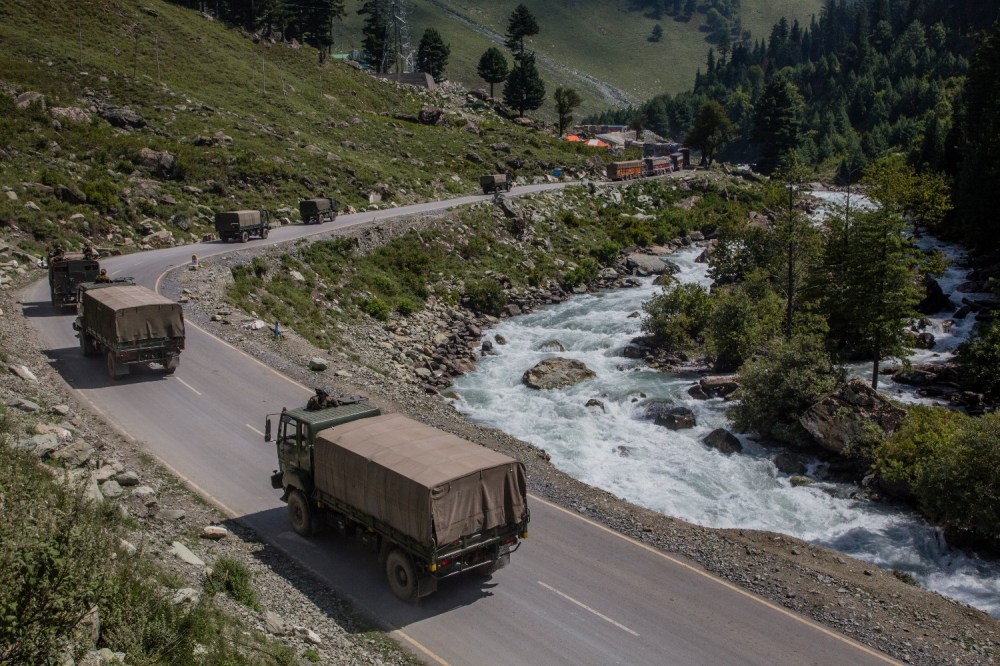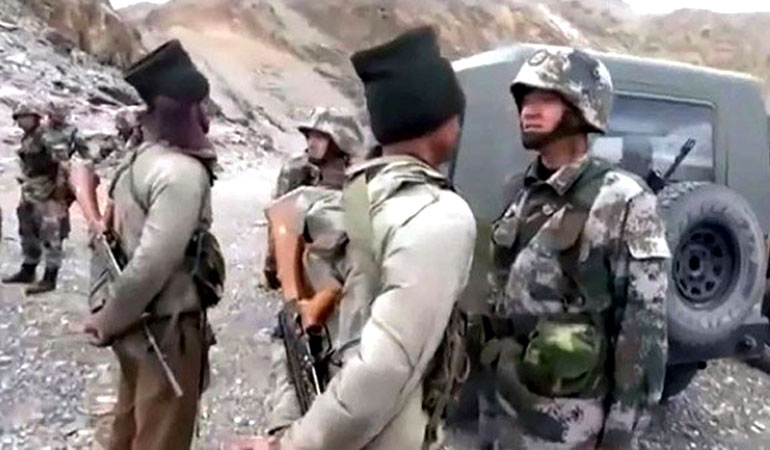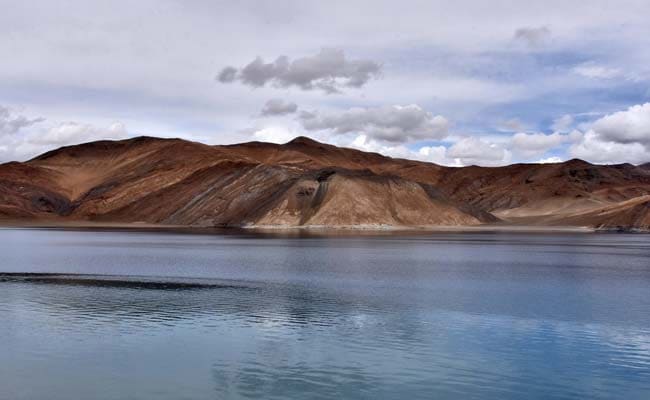Gandaberunda
New Member
- Joined
- Apr 6, 2019
- Messages
- 1,813
- Likes
- 8,576
Both side need optics to show for world after sitting their for more than 8 months...Just Show baazi... thats why so close...
Both side need optics to show for world after sitting their for more than 8 months...Just Show baazi... thats why so close...
That's what I've been trying to point out to you. The Chinese don't need to move assets away from SCS / Taiwan theater.
Funny thing is, India is a bit like China in this regard, but China actually has islands in its ocean and that's its primary focus. But China has a dual land/naval orientation, which is tied together by an air force. The thing is, India is a land problem, not a naval problem, and things like Taiwan / SCS are naval problems, not land problems.
In other words, when India opens a front on containing China, what gets drawn in is the PLAGF, and to a lesser extent, the PLAAF. The PLAN can't actually deploy against Kolkata / Mumbai because of the logistics distance. So when you're thinking you're drawing Chinese resources away, you're drawing away the part of the Chinese military that's otherwise remaining unused.
And, well:

Why China Is Winning Against India
The military standoff in the Himalayas is often seen as a stalemate between two nuclear powers. But New Delhi cannot afford the status quo.foreignpolicy.com
The point being made here is that the InN already had a budget cut because of the Chinese threat. If the Chinese are oriented toward the SCS / Taiwan as their primary mission, the deployment of ground forces has already reduced the InN's ability to intervene in SCS / Taiwan.
===
I'll bring in another analogy. India's position vis-a-vis China right now is similar to China's position vis-a-vis Japan in the early part of the 20th century, although there are quite a few differences (India is more unified than China was versus Japan in the early 20th century, a few insurgencies here and there, but otherwise federal government. The RoC had most of its territory controlled by warlords paying nominal obeisance to the Nationalist government). Unfortunately for China, it was a pre-industrialized society facing an industrialized society, and what's more, Chinese nationalists screwed up. Apparently Chiang Kai-Shek / Jiang Jieshi was seeking to build up against the Japanese forces, but Chinese nationalists forced Chiang's hand into opening the war early. Moreover, if you look at India's present sanctions against China, it resembles China's May Fourth boycotts against Japan, which actually forced Japan to take a military-centric approach instead of a trade-centric approach in expanding its regional dominance.
The end result was that Chiang sacrificed his best divisions to defend Shanghai from the Japanese, to achieve only a delaying action. Chiang, likewise, saw his political system wrecked by years of war against the Japanese, including an uprising against Nationalist levies. The Chinese saw virtually no success against the Japanese, in contrast to the Soviet resistance against the Nazis. Afterwards, the Nationalist system was so weakened that it was unable to stop the Communists, exploiting contradictions created by the war, from defeating them and taking China.
In the same way, Indian nationalists are calling for a hard offset (i.e, major purchases of military equipment) versus China that's unaffordable. I am telling you that a softer offset (i.e, focusing on nuclear deterrence) is more affordable and deters China without allowing China to mushroom Indian defense budgets.
If Indian attitudes are as what they appear, and we can expect a hard build-up in Indian military capabilities, I will wait to see what happens to India's defense spending as a percentage of GDP. If it goes up to 5%, that is good for China, because the taxes and debt involved will weaken and slow India's economy, giving China more time to deal with its primary antagonist, the United States. That's mission accomplished.
===
FYI, contacts in Cong suggest that Indian politicians and analysts know what the strategic balance is and what's happening. But they can't control the bottom elements (i.e, you) from forcing a hard line.
Yes, it does. If PLAAF needs to maintain air superiority, it needs to focus at least 2/3rd of the airforce towards Tibet (fun fact, you don't have infra to support even 1/4th of your airforce in Tibet). That's counting IAF vs. PLAAF excluding ground attack jets.That's what I've been trying to point out to you. The Chinese don't need to move assets away from SCS / Taiwan theater.
We will block your shipping routes and starve you of hydrocarbons. USN will help us to contain you in SCS, PLAAF can't reach us in the Indian ocean to mount an offensive on the Indian Navy. Pakistan Navy is too insignificant to be a threat to us.Funny thing is, India is a bit like China in this regard, but China actually has islands in its ocean and that's its primary focus. But China has a dual land/naval orientation, which is tied together by an air force. The thing is, India is a land problem, not a naval problem, and things like Taiwan / SCS are naval problems, not land problems.
In other words, when India opens a front on containing China, what gets drawn in is the PLAGF, and to a lesser extent, the PLAAF. The PLAN can't actually deploy against Kolkata / Mumbai because of the logistics distance. So when you're thinking you're drawing Chinese resources away, you're drawing away the part of the Chinese military that's otherwise remaining unused.
And, well:

Why China Is Winning Against India
The military standoff in the Himalayas is often seen as a stalemate between two nuclear powers. But New Delhi cannot afford the status quo.foreignpolicy.com
The point being made here is that the InN already had a budget cut because of the Chinese threat. If the Chinese are oriented toward the SCS / Taiwan as their primary mission, the deployment of ground forces has already reduced the InN's ability to intervene in SCS / Taiwan.
Again, as I said before, you are assuming that upscaling our defense spending will slow down the economy. It is not just a scale that putting weight on one side tilts the other. We have vast potential to upscale our economy using industrialization and cheap labor. China virus blues are over, our stock market is at an all-time high.In the same way, Indian nationalists are calling for a hard offset (i.e, major purchases of military equipment) versus China that's unaffordable. I am telling you that a softer offset (i.e, focusing on nuclear deterrence) is more affordable and deters China without allowing China to mushroom Indian defense budgets.
If Indian attitudes are as what they appear, and we can expect a hard build-up in Indian military capabilities, I will wait to see what happens to India's defense spending as a percentage of GDP. If it goes up to 5%, that is good for China, because the taxes and debt involved will weaken and slow India's economy, giving China more time to deal with its primary antagonist, the United States. That's mission accomplished.
I will quote you the story of a country, which kept a country with 10 times its GDP on its toes. They did not have food, development, education, have a high mortality rate, religious extremism, and all the traits of a poor third-world country.This is something that's really shocking to me, not that this is true, but that Indian nationalists would prefer to think this way. You do realize that the Chinese are a 10k GDP per capita country (in nominal terms) and that the most developed provinces (analogues to Tamil Nadu, Kerala) are virtually equivalent to Japan and Korea, right?
The logistical challenges are real; the Chinese have neglected Tibetan infrastructure for quite some time, although there are programs to change this. But the ability to pay for supply (and recall that they make most of the military supply) is there.
===
I guess posting here is just to see how Indian nationalists would react to being told they're being Vietnamized. As it turns out, Indian nationalists don't care and the big question is how much India will expand its defense spending and whether Indian politicians will have the sense to back down. I assume no to the latter, to the former, it's worthwhile to wait and see.
There is still another solution, and that's moving American bases onto Indian soil. But for the Chinese, this is also a success, insofar as it forces the Americans to spend more on global logistics and split forces between more theaters.
Press X to doubt this here lol.I will quote you the story of a country, which kept a country with 10 times its GDP on its toes. They did not have food, development, education, have a high mortality rate, religious extremism, and all the traits of a poor third-world country.
They shamelessly begged in front of every international community, redirected donation money intended for malnourished infants towards buying guns and tanks, they became bitch of world-powers for many years and allowed themselves to be humiliated and violated, and at last, took extravagant loans with no future plans to return the money, and essentially sold themselves to China.
You guessed it, the country I am talking about is Pakistan.
Do you know what got them going? Hatred for India. When your countrymen are ready to eat grass instead of food to support the country, defeating them becomes nearly impossible unless you kill every one of them.
I'm not sure to what extent the Chinese actually care about casualties, since the Chinese were savaged in Vietnam, and kept fighting. Assuming that the other side will back down when they've lost an army is a big mistake; that is how Carthage lost against Rome (Rome just kept on sending more armies to the field faster than Hannibal could crush them).
Also, TBH, this is precisely the problem with the Sino-Indian conflict. You're saying the Indians are nationalistic, emotional, and with a long memorial, but guess what? So are the Chinese. They're still pissed off over stuff that happened more than a hundred years ago.
The advantage for China is that China can afford to offset India. India can't afford to offset China; as I was about to reply to someone else, India is now in recession again. The fundamental drivers of growth in China were the relatively high education level (which permitted industrialization) and a supportive regulatory environment. The former seemed to have been missing in India, and that's what, I suspect, ruined Modi's attempt to expand the Indian economy.
Problem is, when it comes to India, Jamseti Tata already pointed out the flaws in Indian education even before Independence. Indian education has been a long-term endeavor, pushed for many decades, and I don't see it. Even if, since Amartya Sen complained about India's adult literacy rate (50%), it's risen to about 70%, Indian education, which is needed to support industrialization (there are a lot of cultural habits necessary for industrialization, and it takes literacy to permit such), I think it will take time for the kinks to get ironed out.
===
And TBH, when you talk about honor, you're not talking about an honorable army in your opponent. You're talking about a pragmatic army. They gained no "honor" in fighting what was claimed to be the "third strongest army in the world" (after the Vietnamese defeated the United States). But unlike the United States, the Chinese got what they wanted out of Vietnam. It's a question of duty, not honor, and that's a division between types of armies (warrior armies that seek esteem, soldier armies that seek to do the job and achieve the objective). The Chinese are not the Pakistanis.
That's why I'm saying this chest-beating won't work, and that you're being Vietnamized. The Vietnamese were so hardcore as fighters that mothers strapped their babies with bombs and threw them at Chinese vehicles. Yet the Vietnamese ended up spending lots of money to fortify their northern provinces against China, and by the time the Soviet Union fell, the Vietnamese were neutralized. Meanwhile, the Chinese were expanding their economy drastically.
But hey, suit yourself. As I talk to Indian analysts, we agree that the Chinese have a practice of setting up border disputes to "pressure" countries they have feuds with. The border disputes, for the Chinese leadership, at least, are unemotional, and are simply intended to rile up the other side and get people on both sides killed. If you are being told specifically what the trap is, and you don't care, you deserve what's coming to you.
India can/will do the same. Although we deeply care about our casualties, that has not deterred anyone from joining armed forces, only motivated them.I'm not sure to what extent the Chinese actually care about casualties, since the Chinese were savaged in Vietnam, and kept fighting. Assuming that the other side will back down when they've lost an army is a big mistake; that is how Carthage lost against Rome (Rome just kept on sending more armies to the field faster than Hannibal could crush them).
I don't remember India & China having any bad blood 100 years ago. Chinese folks literally have no objective to fight India apart from the foolish expansionist dreams of CCP.Also, TBH, this is precisely the problem with the Sino-Indian conflict. You're saying the Indians are nationalistic, emotional, and with a long memorial, but guess what? So are the Chinese. They're still pissed off over stuff that happened more than a hundred years ago.
India got in recession due to China-virus and strictly-enforced 100% lockdown for many months which made our domestic production nearly zero (apart from agri-sector). America did the opposite, kept the workforce going at expense of people's lives. Our economy is picking pace again as vaccination drive has started and the china virus is in the ending phase.The advantage for China is that China can afford to offset India. India can't afford to offset China; as I was about to reply to someone else, India is now in recession again. The fundamental drivers of growth in China were the relatively high education level (which permitted industrialization) and a supportive regulatory environment. The former seemed to have been missing in India, and that's what, I suspect, ruined Modi's attempt to expand the Indian economy.
Problem is, when it comes to India, Jamseti Tata already pointed out the flaws in Indian education even before Independence. Indian education has been a long-term endeavor, pushed for many decades, and I don't see it. Even if, since Amartya Sen complained about India's adult literacy rate (50%), it's risen to about 70%, Indian education, which is needed to support industrialization (there are a lot of cultural habits necessary for industrialization, and it takes literacy to permit such), I think it will take time for the kinks to get ironed out.
I am talking about an army motivated to fight. Sense of duty, pragmatism lasts till the money exists and a threat to life does not.And TBH, when you talk about honor, you're not talking about an honorable army in your opponent. You're talking about a pragmatic army. They gained no "honor" in fighting what was claimed to be the "third strongest army in the world" (after the Vietnamese defeated the United States). But unlike the United States, the Chinese got what they wanted out of Vietnam. It's a question of duty, not honor, and that's a division between types of armies (warrior armies that seek esteem, soldier armies that seek to do the job and achieve the objective). The Chinese are not the Pakistanis.
That's why I'm saying this chest-beating won't work, and that you're being Vietnamized. The Vietnamese were so hardcore as fighters that mothers strapped their babies with bombs and threw them at Chinese vehicles. Yet the Vietnamese ended up spending lots of money to fortify their northern provinces against China, and by the time the Soviet Union fell, the Vietnamese were neutralized. Meanwhile, the Chinese were expanding their economy drastically.
But hey, suit yourself. As I talk to Indian analysts, we agree that the Chinese have a practice of setting up border disputes to "pressure" countries they have feuds with. The border disputes, for the Chinese leadership, at least, are unemotional, and are simply intended to rile up the other side and get people on both sides killed. If you are being told specifically what the trap is, and you don't care, you deserve what's coming to you.


So the narrative building(if there's a skirmish in the summer) has already begun, if you notice carefully you can see the change in Rajnath Singh's tones, at the beginning he wasn't naming China when calling them out, after that he started calling out China by their name and said "We don't want war but if China violates our sovereignty we will respond" and now he has gone on to say this. It also reflects the Indian armed forces' power on ground, if you notice carefully the rabid pieces written on Global times has reduced greatly, this reflects the change in our position on the ground.

Statement after statement becomes hotter and hotter, this is an open threat to the chinks, a few months before even the army chief's statement was limited to "We are committed to finding the resolution of our disputes through discussions and political efforts " but now even his statements pack a punch. I think the Indian top brass has found serious chinks(pun intended) in the Chinese armor, summer is going to be very bad for them, especially after the army chief threatens them to "not test our patience" which means more re-adjustments may take place if talks don't work. The ball is on China's court now, it is up to them if they want to face military defeat and humiliation in the summer months or the lesser humiliation of taking their troops back before the snow melts, just like those 10K troops that ran away like cowards unable to face the Winter.
such statements usually come when all preparations are done.
| Thread starter | Similar threads | Forum | Replies | Date |
|---|---|---|---|---|
|
|
India-China 2020 Border Dispute - Military and Strategic Discussion | Indian Army | 19501 | |
| V | Non-Military implications of India-China Standoff 2020 | China | 61 | |
|
|
Memes & Jokes India China Standoff 2020 | Members Corner | 334 | |
|
|
India to overtake China in 2020: Swaminathan Aiyar | Economy & Infrastructure | 33 |
